Our Services
What we can do for you
Clinical and radiological diagnostics
Clinical and radiological diagnostics are a form of dentistry that focusses on the performance and interpretation of diagnostic imaging used for the examination of the craniofacial, dental and adjacent structures.
Clinical and radiological diagnostics include cone beam CT, multi-slice CT, MRI, PET, ultrasound scans, dental panoramic radiology, cephalometric imaging, intra-oral imaging, and – in special cases – sialography. This may help with the diagnosis, treatment planning and evaluation of certain conditions.
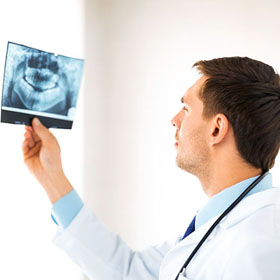
Preventative treatment
Preventive dental treatment prevents patients from developing oral problems such as cavities, gingivitis, enamel loss and periodontitis. Although everyone can benefit from preventive dental treatments, children, in particular, have more to gain as it allows their newly developed permanent teeth to grow strong and healthy. Dental sealants and topical fluoride treatments, in particular, help to prevent the decay of a child’s tooth. In adults, preventive dentistry allows them to maintain their oral health and keep their natural teeth as long as possible.
Oral health is connected to your overall health, as the mouth can be a breeding ground for harmful bacteria. With preventive dentistry, you can greatly decrease the risk of developing oral problems, thus increasing your chances of living a healthy life.
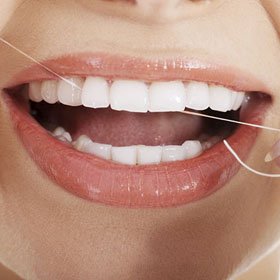
Restorative and reconstructive treatment
Our mouths consist of many tissues, both soft and hard. Soft tissue includes the gums, tongue, inner cheeks, and lips, while the hard tissue includes the teeth and the jawbone. There are also many connective tissues that hold the structure of the mouth together, as well as blood vessels and nerves. The health of our mouths depends on the functionality of all of these systems. When these systems fail to work in harmony, our oral health becomes compromised.
Restorative and reconstructive dentistry refers to the various procedures that are designed to replace missing teeth, repair damaged teeth, correct misaligned teeth and faulty bites, address jawbone and gum damage, replace worn-out dental work, and treat diseased of the mouth. These procedures may be performed independently, however, when there are multiple oral health problems, a full mouth reconstruction may be advised.
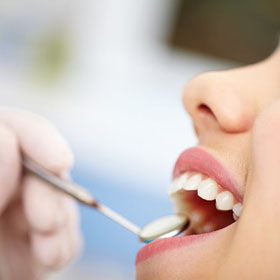
Extractions and minor oral and periodontal surgery
Many procedures are carried out on a daily basis inside our dental practice. A majority of these procedures are minor oral surgeries, as opposed to major oral surgeries which include treatment and reconstructive surgery for oral cancer, skeletal correction and neck trauma to name but a few.
Minor oral surgery procedures include the following:
- Simple extractions of the root or the whole teeth, where no soft tissue or bone removal is required.
- Surgical extractions of the root or the whole teeth, where soft tissue alone, or with bone, has to be removed to gain access to the root or tooth.
- Operculectomy. This is the surgical removal of the gingival flap overlying a partially erupted tooth.
- Alveolectomy. This is the surgical adjustment and removal of bone spicules from the alveolar ridge after tooth extraction, to produce a smooth base for denture seating.
- Gingivectomy and gingivoplasty. This is periodontal soft tissue surgery, aimed at adjusting the shape of the gingivae to aid oral hygiene measures.
- Periodontal flap surgery. This is the surgical raising and replacing of periodontal flaps, to enable subgingival debridement to be carried out.
- Soft tissue biopsies. This is the partial or complete removal of soft tissue oral lesions, for pathological investigation and diagnosis.
Most patients find these surgical procedures to be worrying or unnerving. That is because these types of procedures tend to involve bleeding and possible postoperative pain. To ensure that our patients are comfortable and at ease in our practice, we offer sedatives before any minor or major oral surgery.
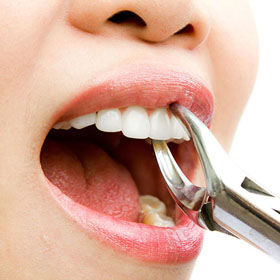
Dentures, mouth guards, night guards
Dentures are removable replacements for missing teeth and the surrounding tissues. There are two types of dentures, namely complete and partial dentures. Complete dentures are used to replace all the teeth in the mouth, while partial dentures are only used when some of the natural teeth remain. Dentures are designed to look like natural teeth, so there is no noticeable change in your appearance.
Made of flexible plastic, mouth guards and night guards are custom designed and moulded to fit the shape of your teeth. Mouth guards were created to protect the jaw and teeth during physical activity such as sports, or any other activity that involves the possibility of being hit on the mouth. Night guards are recommended for patients who clench or grind their teeth at night, as a way to protect the teeth from damage caused by clenching and teeth grinding. Guards also protect the soft tissue of your lips, cheek lining and your tongue.

Endodontic treatment
Under the tooth enamel, inside the hard layer of the dentin, there is a soft tissue called the pulp. The pulp helps the root of your tooth to grow when your teeth are still developing. It contains blood vessels, nerves and connective tissue. When your teeth are fully developed, it can survive without the pulp, because the tooth continues to receive nourishments from the tissue surrounding it.
When damage occurs to a tooth and becomes infected, the infection destroys the pulp. If left untreated, the damaged pulp can spread the infection to the bone around the tooth, causing swelling and moderate to severe pain. Many patients wait until the pain becomes unbearable, before seeking dental assistance. This is when endodontic treatment (often referred to as Root Canal Therapy) is performed to save the tooth.
Endodontic treatment involves the opening of the tooth through tiny canals, removing the damaged pulp, cleaning, shaping, filling and sealing the tooth.
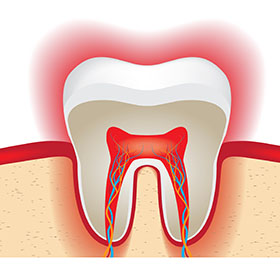
Tooth whitening
Tooth whitening in a dental practice lightens and brightens teeth, while removing stains and discolouration. Tooth whitening is one of the most popular cosmetic dental procedures, because it can dramatically improve the appearance of your teeth.
Contrary to popular beliefs, tooth whitening is not a one-time procedure. It needs to be repeated from time to time in order for you to maintain a whiter, brighter smile.
The colour of the tooth enamel (the outer layer of the tooth) is created by the reflection and scattering of light off the tooth, combined with the colour of the dentin beneath the enamel. Your genes and lifestyle choices affect the thickness and smoothness of the enamel. Thinner enamel allows the colour of the dentin to shine through, causing teeth to appear darker.
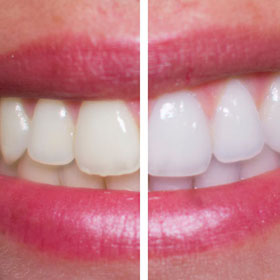
Nitrous Oxide Sedation
Nitrous oxide (sometimes referred to as “laughing gas”) is a safe and effective sedative agent. Nitrous oxide is mixed with oxygen and inhaled through a mask that fits over your nose to help you relax and be at ease in the dental seat.
Although nitrous oxide will give you a light-headed or tingling feeling in your arms and legs, it is not intended to put you to sleep. It merely makes you feel more comfortable during dental procedures. You will still be able to hear and respond to the dentists. The effects of nitrous oxide wear off shortly after the mask is removed.
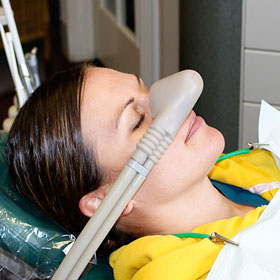
Dental Implants
Dental implants are a popular way of replacing missing teeth. Consisting of metal posts or frames, dental implants are surgically positioned into the jawbone beneath your gums, providing stability and support for the artificial tooth.
A single tooth, dental bridges and dentures can be mounted to implants, ensuring that it won’t slip or shift around your mouth. This is an important benefit when speaking and eating. For some people, ordinary dentures and bridges are not comfortable or even possible due to sore spots or gagging. One of the advantages of implants is that no other teeth need to be prepared in order to hold the new replacement tooth – or teeth - in place.
To be considered for dental implants, you will need to have healthy gums and strong jawbone to adequately support the implant. You will also need to commit yourself to keeping the structures inside of your mouth healthy. Therefore, meticulous oral hygiene and regular dental visits are critical to the success and longevity of dental implants.
